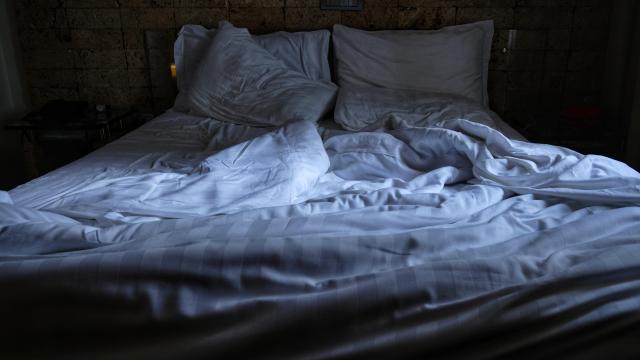Loud snoring may be a harbinger of much bigger problems, research out this week suggests. The study found a link between severe sleep apnea in older adults and greater amounts of a specific biomarker in the brain — one that could increase people’s risk of dementia or stroke. More research will be needed to understand this connection, however.
Sleep apnea is a condition in which a person stops breathing during sleep. This causes the brain to wake the person just enough to start breathing, only for the cycle to start again once the person falls back asleep. There are two main forms of sleep apnea, obstructive and central. Obstructive apnea happens when airway muscles physically block a person’s breathing, while central apnea is when the brain forgets to signal the body to breath (a third mixed form has features of both).
Though not all snoring is linked to obstructive sleep apnea, it’s a common sign of the condition (snoring in general is caused by a narrow airway while sleeping). The constant interruptions caused by apnea also make it hard for people to get a restful night’s sleep, which can then affect their physical and mental health in varying ways.
Sleep apnea, especially when severe, has been linked to a greater risk of many other health problems, including cardiovascular disease. In this new study, published Thursday in the journal Neurology, scientists wanted to get a better understanding of how the condition could possibly affect the brain.
They looked at data collected from 140 older adults with obstructive sleep apnea who had participated in an earlier study. These volunteers had undergone an MRI brain scan and were monitored overnight in a sleep lab. They were divided into three groups based on their diagnosed degree of sleep apnea, but all of them were thought to be free of dementia at the start and end of the study period.
Compared to people with mild or moderate sleep apnea, the researchers found, those with severe sleep apnea had a greater amount of white matter hyperintensities — tiny lesions in the brain’s white matter that can be seen on an MRI. Those with severe apnea also tended to experience less slow-wave sleep, or deep sleep, and a lack of deep sleep was similarly associated with more white matter hyperintensities.
White matter hyperintensities frequently become more common the older we get. But having a greater number of these lesions has been linked to a higher risk of conditions such as dementia and stroke. So this potential connection is definitely cause for alarm, the study authors say.
“These biomarkers are sensitive signs of early cerebrovascular disease,” said study author Diego Carvalho, a researcher at the Mayo Clinic in Rochester, Minnesota, in a statement released by the American Academy of Neurology. “Finding that severe sleep apnea and a reduction in slow-wave sleep are associated with these biomarkers is important since there is no treatment for these changes in the brain, so we need to find ways to prevent them from happening or getting worse.”
At the same time, the exact nature of this relationship between sleep apnea and these biomarkers is still unclear. For one, we can’t tell from this data whether having severe sleep apnea actually causes these lesions to become more abundant. It’s possible that these lesions might predate or even help worsen a person’s sleep apnea, or that another factor helps raise the risk of having either. The researchers say that longer-term studies will be needed to confirm a cause-and-effect link, as well as answer other questions.
“More research is needed to determine whether sleep issues affect these brain biomarkers or vice versa,” Carvalho said. “We also need to look at whether strategies to improve sleep quality or treatment of sleep apnea can affect the trajectory of these biomarkers.”
That said, some studies have found that treating sleep apnea might lower the risk of dementia.
